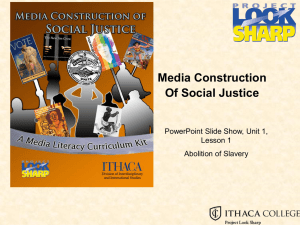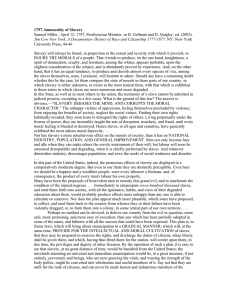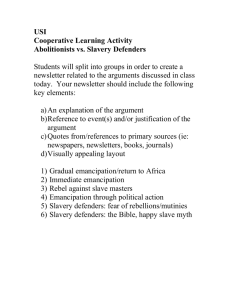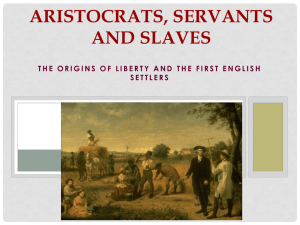1827. Nathaniel Paul Emancipation Address
advertisement
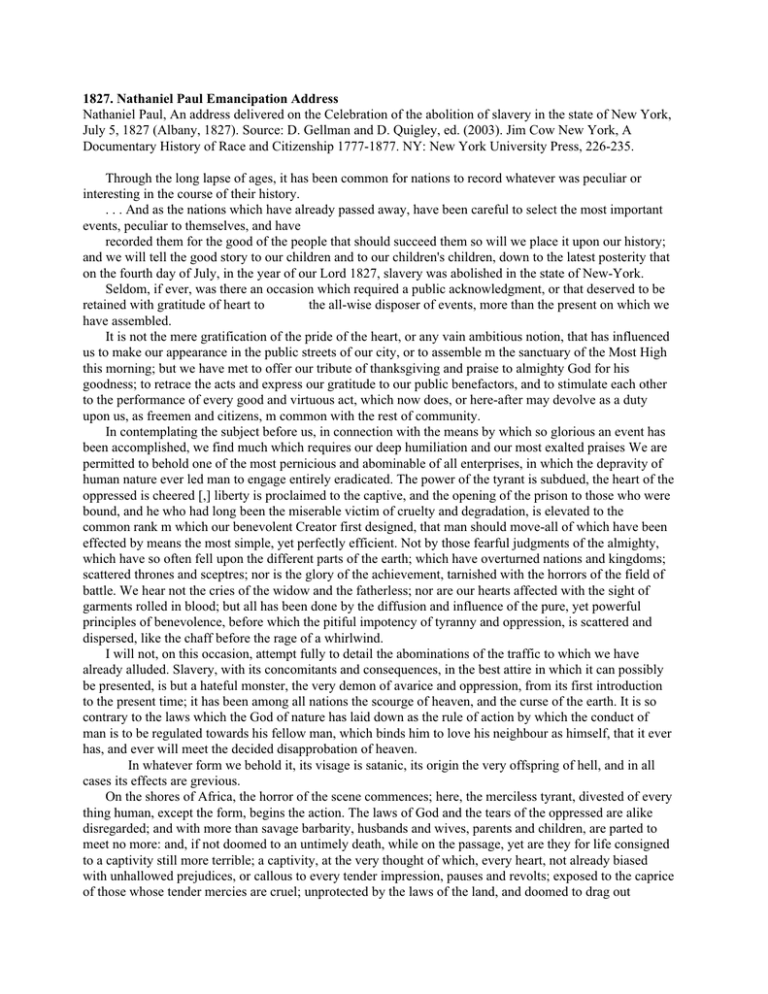
1827. Nathaniel Paul Emancipation Address Nathaniel Paul, An address delivered on the Celebration of the abolition of slavery in the state of New York, July 5, 1827 (Albany, 1827). Source: D. Gellman and D. Quigley, ed. (2003). Jim Cow New York, A Documentary History of Race and Citizenship 1777-1877. NY: New York University Press, 226-235. Through the long lapse of ages, it has been common for nations to record whatever was peculiar or interesting in the course of their history. . . . And as the nations which have already passed away, have been careful to select the most important events, peculiar to themselves, and have recorded them for the good of the people that should succeed them so will we place it upon our history; and we will tell the good story to our children and to our children's children, down to the latest posterity that on the fourth day of July, in the year of our Lord 1827, slavery was abolished in the state of New-York. Seldom, if ever, was there an occasion which required a public acknowledgment, or that deserved to be retained with gratitude of heart to the all-wise disposer of events, more than the present on which we have assembled. It is not the mere gratification of the pride of the heart, or any vain ambitious notion, that has influenced us to make our appearance in the public streets of our city, or to assemble m the sanctuary of the Most High this morning; but we have met to offer our tribute of thanksgiving and praise to almighty God for his goodness; to retrace the acts and express our gratitude to our public benefactors, and to stimulate each other to the performance of every good and virtuous act, which now does, or here-after may devolve as a duty upon us, as freemen and citizens, m common with the rest of community. In contemplating the subject before us, in connection with the means by which so glorious an event has been accomplished, we find much which requires our deep humiliation and our most exalted praises We are permitted to behold one of the most pernicious and abominable of all enterprises, in which the depravity of human nature ever led man to engage entirely eradicated. The power of the tyrant is subdued, the heart of the oppressed is cheered [,] liberty is proclaimed to the captive, and the opening of the prison to those who were bound, and he who had long been the miserable victim of cruelty and degradation, is elevated to the common rank m which our benevolent Creator first designed, that man should move-all of which have been effected by means the most simple, yet perfectly efficient. Not by those fearful judgments of the almighty, which have so often fell upon the different parts of the earth; which have overturned nations and kingdoms; scattered thrones and sceptres; nor is the glory of the achievement, tarnished with the horrors of the field of battle. We hear not the cries of the widow and the fatherless; nor are our hearts affected with the sight of garments rolled in blood; but all has been done by the diffusion and influence of the pure, yet powerful principles of benevolence, before which the pitiful impotency of tyranny and oppression, is scattered and dispersed, like the chaff before the rage of a whirlwind. I will not, on this occasion, attempt fully to detail the abominations of the traffic to which we have already alluded. Slavery, with its concomitants and consequences, in the best attire in which it can possibly be presented, is but a hateful monster, the very demon of avarice and oppression, from its first introduction to the present time; it has been among all nations the scourge of heaven, and the curse of the earth. It is so contrary to the laws which the God of nature has laid down as the rule of action by which the conduct of man is to be regulated towards his fellow man, which binds him to love his neighbour as himself, that it ever has, and ever will meet the decided disapprobation of heaven. In whatever form we behold it, its visage is satanic, its origin the very offspring of hell, and in all cases its effects are grevious. On the shores of Africa, the horror of the scene commences; here, the merciless tyrant, divested of every thing human, except the form, begins the action. The laws of God and the tears of the oppressed are alike disregarded; and with more than savage barbarity, husbands and wives, parents and children, are parted to meet no more: and, if not doomed to an untimely death, while on the passage, yet are they for life consigned to a captivity still more terrible; a captivity, at the very thought of which, every heart, not already biased with unhallowed prejudices, or callous to every tender impression, pauses and revolts; exposed to the caprice of those whose tender mercies are cruel; unprotected by the laws of the land, and doomed to drag out miserable existence, without the remotest shadow of a hope of deliverance, until the king of terrors shall have executed his office, and consigned them to the kinder slumbers of death. But its pernicious tendency may be traced still farther: not only are its effects of the most disastrous character, in relation to the slave, but it extends its influence to the slave holder; and in many instances it is hard to say which is most wretched, the slave or the master. . . . Strange, indeed, is the idea, that such a system, fraught with such consummate wickedness, should ever be found a place in this the otherwise happiest of all countries-a country, the very soil of which is said to be consecrated to liberty, and its fruits the equal rights of man. But strange as the idea may seem, or paradoxical as it may appear to those acquainted with the constitution of the government, or who have read the bold declaration of this nation's independence; yet it is a fact that can neither be denied or controverted, that in the United States of America, at the expiration of fifty years after its becoming a free and independent nation, there are no less than fifteen hundred thousand human beings still in a state or unconditional vassalage. Yet America is first in the profession of the love of liberty, and loudest in proclaiming liberal sentiments towards all other nations, and feels herself insulted, to be branded with any thing bearing the appearance of tyranny or oppression. Such are the palpable inconsistencies that abound among us and such is the medley of contradictions which stain the national character, and renders the American republic a by-word, even among despotic nations. But while we pause and wonder at the contradictory sentiments held forth by the nation, and contrast its profession and practice, we are happy to have it in our power to render an apology for the existence of the evil, and to offer an excuse for the framers of the constitution. It was before the sons of Columbia felt the yoke of their oppressors, and rose in their strength to put it off that this land become [sic] contaminated with slavery. Had this not been the case, led by the spirit of pure republicanism, that then possessed the souls of those patriots who were struggling for liberty, this soil would have been sufficiently guarded against its intrusion, and the people of these United States to this day, would have been strangers to so great a curse. It was by the permission of the British parliament, that the human species first became an article of merchandize among them, and as they were accessary to its introduction, it well becomes them to be, first, as a nation, in arresting its progress and effecting its expulsion. It was the immortal Clarkson, a name that will be associated with all that is sublime in mercy, until the final consummation of all things, who first looking abroad, beheld the sufferings of Africa, and looking at home, he saw his country stained with her blood. He threw aside the vestments of the priesthood, and consecrated himself to the holy purpose of rescuing a continent from rapine and murder, and of erasing this one sin from the book of his nation's iniquities. . . . Happy for us, my brethren, that the principles of benevolence were not exclusively confined to the isle of Great Britain. There have lived, and there still do live, men in this country, who are patriots and philanthropists, not merely in name, but in heart and practice; men whose compassions have long since led them to pity the poor and despised sons of Africa. They have heard their groans, and have seen their blood, and have looked with an holy indignation upon the oppressor: nor was there any thing wanting except the power to have crushed the tyrant and liberated the captive. Through their instrumentality, the blessings of freedom have long since been enjoyed by all classes of people throughout New-England, and through their influence, under the Almighty, we are enabled to recognize the fourth day of the present month, as the day in which the cause of justice and humanity have triumphed over tyranny and oppression, and slavery is forever banished from the state of New-York. Among the many who have vindicated the cause of the oppressed, within the limits of this state, we are proud to mention the names of Eddy and Murray, of Jay and Tompkins, who, together with their fellow philanthropists embarked in the holy cause of emancipation, with a zeal which well expressed the sentiments of their hearts. They proved themselves to be inflexible against scorn, persecution and contempt; and although all did not live to see the conflict ended, yet their survivors never relaxed their exertions until the glorious year of 1817, when, by the wise and patriotic legislature of this state, a law was passed for its final extirpation. We will mourn for those who are gone, we will honour those who survive, until time extinguishes the lamp of their existence. When dead, they shall still live in our memory; we will follow them to their tombs, wewill wet their graves with our tears; and upon the heart of every descendant of Africa, their deeds shall be written, and their names shall vibrate sweetly from ear to ear, down to the latest posterity. From what has already taken place, we are encouraged to expect still greater things. We look forward with pleasing anticipation to that period, when it shall no longer be said that in a land of freemen there are men in bondage, but when this foul stain will be entirely erased, and this, worst of evils, will be forever done away. The progress of emancipation, though slow, is nevertheless certain: It is certain, because that God who has made of one blood all nations of men, and who is said to be no respecter of persons, has so decreed; I therefore have no hesitation in declaring from this sacred place, that not only throughout the United States of America, bur throughout every part of the habitable world where slavery exists, it will be abolished. However great may be the opposition of those who are supported by the traffic, yet slavery will cease. The lordly planter who has his thousands in bondage, may stretch himself upon his couch of ivory, and sneer at the exertions which are made by the humane and benevolent, or he may take his stand upon the floor of Congress, and mock the pitiful generosity of the east or west for daring to meddle with the subject, and attempting to expose its injustice: he may threaten to resist all efforts for a general or a partial emancipation even to a dissolution of the union. But still I declare that slavery will be extinct; a universal and not a partial emancipation must take place; nor is the period far distant. The indefatigable exertions of the philantrophists in England to have it abolished in their West India Islands, the recent revolutions in South America, the catastrophe and exchange of power in the Isle of Hayti, the restless disposition of both master and slave in the southern states, the constitution of our government, the effects of literary and moral instruction, the generous feelings of the pious and benevolent, the influence and spread of the holy religion of the cross of Christ, and the irrevocable decrees of Almighty God, all combine their efforts, and with united, voice declare, that the power of tyranny must be subdued, the captive must be liberated, the oppressed go free, and slavery must revert back to its original chaos of darkness, and be forever annihilated from the earth. Did I believe that it would always continue, and that man to the end of time would be permitted with impunity to usurp the same undue authority over his fellow, I would disallow any allegiance or obligation I was under to my fellow creatures, or any submission that I owed to the laws of my country; I would deny the superintending power of divine providence in the affairs of this life; I would ridicule the religion of the Saviour of the world, and treat as the worst of men the ministers of the everlasting gospel; I would consider my Bible as a book of false and delusive fables, and commit it to the flames; nay, I would still go farther; I would at once confess myself an atheist, and deny the existence of a holy God. But slavery will cease, and the equal rights of man will be universally acknowledged. Nor is its tardy progress any argument against its final accomplishment. But do I hear it loudly responded-this is but a mere wild fanaticism, or at best but the misguided conjecture of an untutored descendant of Africa. Be it so. I confess my ignorance, and bow with due deference to my superiors in understanding; but if in this case I err, the error is not peculiar to myself; if I wander, I wander in a region of light from whose political hemisphere the sun of liberty pours forth his refulgent rays, around which dazzle the star like countenances of Clarkson, Wilberforce, Pitt, Fox and Grenville, Washington, Adams, Jefferson, Hancock and Franklin; if I err, it is their sentiments that have caused me to stray.n For these are the doctrines which they taught while with us; nor can we reasonably expect that since they have entered the unbounded space of eternity, and have learned more familiarly the perfections of that God who governs all things that their sentiments have altered. Could they now come forth among us, they would tell that what they have learned in the world of spirits, has served only to confirm what they taught while here; they would tell us, that all things are rolling on according to the sovereign appointment of the eternal Jehovah, who will overturn and overturn until he whose right it is to reign, shall come and the period will be ushered in; when the inhabitants of the earth will learn by experience what they are now slow to believe-that our God is a God of justice, and no respecter of persons. But while, on the one hand, we look back and rejoice at what has already taken place, and on the other, we look forward with pleasure to that period when men will be respected according to their characters, and not according to their complexion, and when their vices alone will render them contemptible; while we rejoice at the thought of this land's becoming a land of freemen, we pause, we reflect. What, we would ask, is liberty without virtue? It tends to lasciviousness; and what is freedom but a curse, and even destruction, to the profligate? Not more desolating in its effects is the mountain torrent, breaking from its lofty confines and rushing with vast impetuosity upon the plains beneath, marring as it advances all that is lovely in the works of nature and of art, than the votaries of vice and immorality, when permitted to range unrestrained. Brethren, we have been called into liberty; only let us use that liberty as not abusing it. The day commences a new era in our history; new scenes, new prospects, open before us, and it follows as a necessary consequence, that new duties devolve upon us; duties, which if properly attended to, cannot fail to improve our moral condition, and elevate us to a rank of respectable standing with the community; or if neglected, we fall at once into the abyss of contemptible wretchedness: It is righteousness alone that exalteth a nation, and sin is a reproach to any people. Our liberties, says Mr. Jefferson, are the gift of God, and they are not to be violated but with his wrath. Nations and individuals have been blest of the Almighty in proportion to the manner in which they have appreciated the mercies conferred upon them: an abuse of his goodness has always incured his righteous frown while a right improvement of his beneficence has secured and perpetuated his gracious smiles: an abuse of his goodness has caused those fearful judgments which have destroyed cities, demolished thrones, overturned empires, and humbled to the dust, the proudest and most exalted of nations. As a confirmation of which, the ruinous heaps of Egypt, Tyre, Babylon, and Jerusalem, stand as everlasting monuments. If we would then answer the great design of our creation, and glorify the God who has made us; if we would avert the judgment of Heaven; if we would honor our public benefactors; if we would counteract the designs of our enemies; if we would have our own blessings perpetuated, and secure the happiness of our children and our children's children let each come forward and act well his part, in whatever circle he may move, or in whatever station he may fill; let the fear of God and the good of our fellow men, be the governing principles of the heart. We do well to remember, that every act of ours is more or less connected with the general cause of the people of colour, and with the general cause of emancipation. Our conduct has an important bearing, not only on those who are yet in bondage in this country, but its influence is extended to the isles of India, and to every part of the world where the abomination of slavery is known. Let us then relieve ourselves from the odious stigma which some have long since cast upon us, that we were incapacitated by the God of nature, for the enjoyment of the rights of freemen, and convince them and the world that although our complexion may differ, yet we have hearts susceptible of feeling; judgment capable of discerning, and prudence sufficient to manage our affairs with discretion, and by example prove ourselves worthy the blessings we enjoy.... The wide field of usefulness is now open before us, and we are called upon by every consideration of duty which we owe to our God, to ourselves, to our children, and to our fellow-creatures generally, to enter with a fixed determination to act well our part, and labour to promote the happiness and welfare of all. There remains much to be done, and there is much to encourage us to action. The foundation for literary, moral and religious improvement, we trust, is already laid in the formation of the public and private schools, for the instruction of our children, together with the churches of different denominations already established. From these institutions we are encouraged to expect the happiest results; and while many of us are passing down the declivity of life, and fast hastening to the grave, how animating the thought, that the rising generation is advancing under more favourable auspicies than we were permitted to enjoy, soon to fill the places we now occupy; and in relation to them vast is the responsibility that rests upon us; much of their future usefulness depends upon the discharge of the duties we owe them. They are advancing, not to fill the place of slaves, but of freemen: and in order to fill such a station with honor to themselves, and with good to the public, how necessary their education, how important the moral and religious cultivation of their minds'. Blessed be God, we live in a day that our fathers desired to see, but died without the sight: a day in which science, like the sun of the firmament, rising, darting as he advances his beams to every quarter of the globe. The mists and darkness scatter at his approach, and all nations and people are blessed with his rays; so the glorious light of science is spreading from east to west, and Afric's sons are catching the glance of its beams as it passes; its enlightening rays scatter the mists of moral darkness and ignorance which have but too long overshadowed their minds; it enlightens the understanding, directs the thoughts of the heart, and is calculated to influence the soul to the performance of every good and virtuous act. The God of Nature has endowed our children with intellectual powers surpassed by none; nor is there any thing wanting but their careful cultivation, in order to fit them for stations the most honorable, sacred, or useful. And may we not, without becoming vain in our imaginations, indulge the pleasing anticipation, that within the little circle of those connected with our families, there may hereafter be found the scholar, the states- man, or the herald of the cross of Christ: Is it too much to say, that among that little number there shall yet be one found like to the wise legislator of Israel, who shall take his brethren by the hand, and lead them forth from worse than Egyptian bondage, to the happy Canaan of civil and religious liberty; or one whose devotedness towards the cause of God, and whose zeal for the salvation of Africa, shall cause him to leave the land which gave him birth, and cross the Atlantic, eager to plant the standard of the cross upon every hill of that vast continent, that has hitherto ignobly submitted to the baleful crescent, or crouched under the iron bondage of the vilest superstition. Our prospects brighten as we pursue the subject, and we are encouraged to look forward to that period when the moral desert of Africa shall submit to cultivation, and verdant groves and fertile vallies, watered by the streams of Siloia, shall meet the eye that has long surveyed only the wide spread desolations of slavery, despotism, and death. How changed shall then be the aspect of the moral and political world! Africa, elevated to more than her original dignity, and redressed for the many aggravated and complicated wrongs she has sustained, with her emancipated sons, shall take her place among the other nations of the earth. The iron manacles of slavery shall give place to the still stronger bonds of brotherly love and affection, and justice and equity shall be the governing principles that shall regulate the conduct of men of every nation. Influenced by such motives, encouraged by such prospects, let us enter the field with a fixed determination to live and to die in the holy cause.

